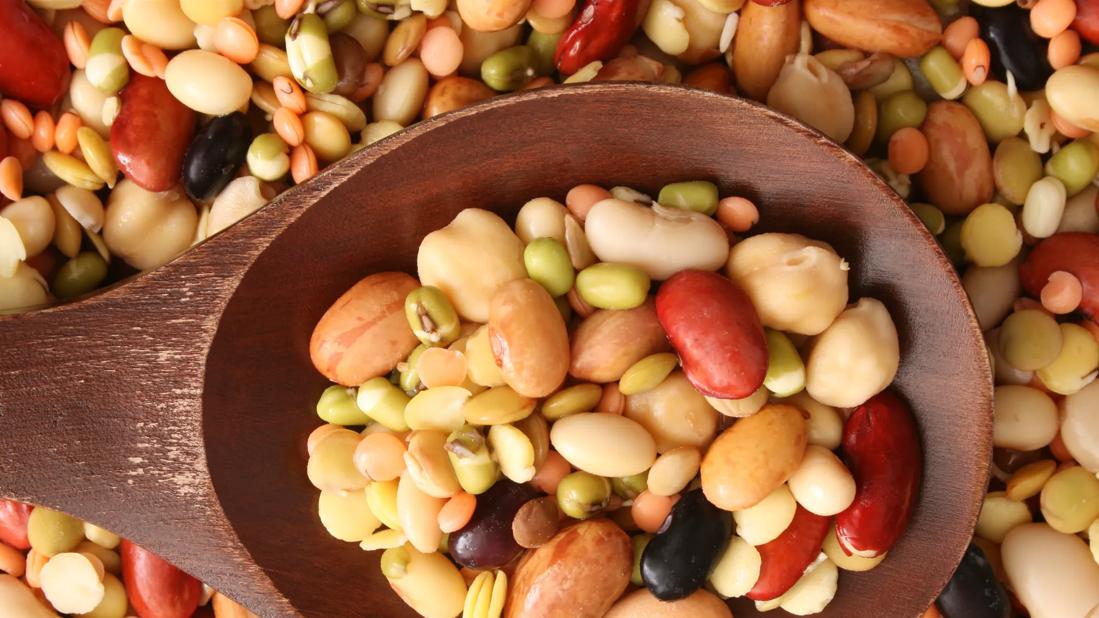This superfood fights cancer and heart disease, stabilizes blood sugar and helps with weight loss

Image content: This image is available to view online.
View image online (https://assets.clevelandclinic.org/transform/9617f174-e686-4860-9275-cc67594d64d0/beans-157643337)
Big wooden serving spoon filled with assorted beans and legumes
Beans are nutritional powerhouses. Packed with protein, fiber, antioxidants, vitamins and minerals, they’re a staple in many diets worldwide. Eating beans can help lower cholesterol, maintain healthy blood sugar levels, fight cancer, promote digestive health and even help manage weight.
Advertisement
Cleveland Clinic is a non-profit academic medical center. Advertising on our site helps support our mission. We do not endorse non-Cleveland Clinic products or services. Policy
There are many types of beans, each with its own texture and flavor, says registered dietitian Julia Zumpano, RD, LD. Popular beans include:
Are beans the same as legumes? “All beans are legumes, but not all legumes are beans,” explains Zumpano. “Legumes are a broader category of plants that includes beans, peas, lentils and peanuts. Beans are one category of legumes that offer unique benefits and tastes.”
“Beans are a superfood because they’re relatively low in fat and calories and full of nutrients,” says Zumpano.
Here are some top benefits of eating beans.
“Beans provide healthy, plant-based protein, and the fiber in beans helps lower the risk of many chronic diseases,” shares Zumpano. “They’re packed with other essential minerals and disease-fighting antioxidants.”
Beans are also a great source of B vitamins, which help keep your brain and nervous system healthy. The exact nutrient profile depends on the specific bean, but in general, they’re good sources of:
Advertisement
They’re also full of antioxidants, which help neutralize the harmful effects of free radicals. The antioxidants in beans include:
Eating more fiber is an excellent way to improve digestion — and your overall health. Beans contain key substances that benefit your gastrointestinal (GI) tract and digestion:
You may think of high blood glucose (sugar) as something only people with diabetes need to worry about. “But even people who don’t have diabetes benefit from avoiding blood sugar spikes — and the inevitable, unpleasant crashes that follow,” notes Zumpano.
Research shows that people who regularly eat beans have lower blood sugar levels, avoiding those troublesome spikes. “Stable blood sugar keeps your energy steady throughout the day,” she adds. “Studies also show that the resistant starch in beans may help reduce the risk of developing Type 2 diabetes.”
A review of 21 clinical trials concluded that eating beans and other legumes daily resulted in weight loss, even without trying to restrict calories. The same review also concluded that eating beans can reduce body fat.
In another study, participants who ate beans on a calorie-reduced diet for six weeks lost more inches from their waist than those who followed the same calorie restriction without beans.
“Researchers believe the weight loss effect of beans is due to satiety — the feeling of fullness,” says Zumpano. “Beans take longer to digest than simple carbs, and the fiber and protein help you feel satisfied.”
“Heart disease is widespread, but our food choices can significantly reduce our risk,” says Zumpano. Beans are a powerful part of a heart-healthy diet. The potassium in beans helps you maintain healthy blood pressure.
“The soluble fiber in beans binds around bile in our guts and removes it with the body’s waste,” she continues. “Bile is composed of cholesterol, therefore aiding in the elimination of cholesterol. For every 1 gram of soluble fiber, you can lower your cholesterol by 1%.”
Beans also benefit your heart by reducing:
“No single food can prevent or treat cancer or any other disease,” clarifies Zumpano. “But the beneficial phytonutrients in beans can help lower cancer risk.”
Black beans are particularly high in anthocyanins that protect your cells from DNA damage that can lead to cancer.
Advertisement
Incorporating more beans into your diet can be simple and delicious because they fit into almost any meal.
Some people avoid beans because of the gassy side effects. The fiber in beans can cause gas, and natural sugars, called oligosaccharides, worsen the effect. To reduce gas, Zumpano suggests soaking and rinsing your beans:
It also helps to start with tiny servings and gradually increase the amount you eat to allow your system to adjust. Consuming them pureed can also help decrease the gassiness effect.
“Even if you don’t think you can tolerate beans, it’s worth trying,” encourages Zumpano. “They’re just so incredibly nutritious.”
Advertisement

Sign up for our Health Essentials emails for expert guidance on nutrition, fitness, sleep, skin care and more.
Learn more about our editorial process.
Advertisement
Pick bell peppers to help fight cancer, memory decline and joint pain
The tropical fruit is a good source of antioxidants and vitamin C
High amounts of cholesterol and saturated fat in red meat may be linked to heart disease
The leaves and pods from this tree are rich in essential nutrients
This starchy root vegetable is a staple in many global cuisines — but it has to be prepared correctly, or it can cause serious concerns
These delicate green sprouts can give you an extra dose of vitamin K and other nutrients — but they’re not safe for everyone
Edamame, lentils and chicken breast are good sources of protein
Eating this root vegetable can help support your eye, heart and brain health
Prioritize your health by managing stress, strengthening your social connections and getting quality sleep
Bolsters, blankets, pillows and blocks can offer extra support, stability and comfort
Allergies, postnasal drip, asthma or reflux could be to blame for a cough that won’t quit